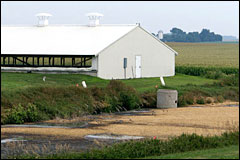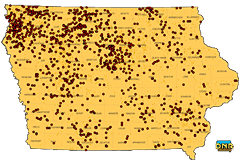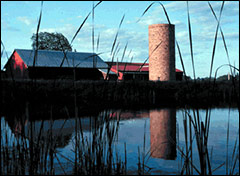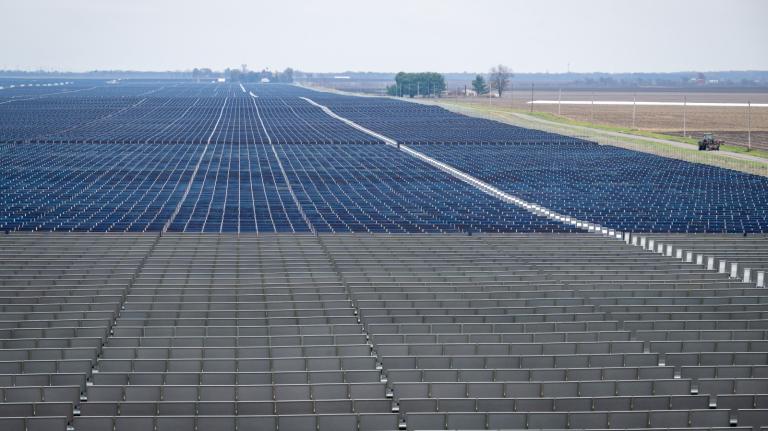The following letter was mailed anonymously to Marian Kuper, whom we featured in last week’s “A Tale of Two Counties.” She shared it with Tom Philpott so we could give readers a sense of the frustrations brewing in CAFO country. We welcome responses from other perspectives.
I know that others still believe the United States and Iowa are sound democracies. I cannot be one of those. For about a dozen years I have fought for what I thought were my rights to a life without health hazards from vertically integrated confined-animal feeding operations (CAFOs), a life where my property rights were respected, a life where I knew my neighbors who talked to me and shared their ongoing decisions with me, or a life where I felt safe and secure. I have none of that — I am a second-class citizen who is constantly being told there is nothing anyone can do to help me. There can be no democracy when no politician will act in your interests. Meanwhile, 80 percent of the pork raised in the United States comes from just 10 percent of the producers — the CAFO hog owners, whoever they be.
It starts at the construction phase — you might get informed now with a permit application notice. In the past, you got informed when the bulldozer started tearing apart what was a crop field — possibly with the seedling crop still there. There was no warning that some unknown entity was moving in down the road. No one knows who it is. A trip to the county courthouse might provide a name — some limited liability corporation from who knows where representing who knows what investors. There might be some rumors that it was one of the big producers — but nowhere on the application does it ask who will own the hogs at that site. No one stops at your door to explain what is happening.
There is a process involving the county supervisors and the state Department of Natural Resources. It seems, though, that they rubber stamp everything, because only one application in a hundred ever seems to become controversial, and less than that are ever denied. Some people have spent money and time fighting this — only to lose. (If you know of anyone who won, I’d love to know that story.)
Most of us who tried to do something have come away disheartened, disillusioned, and downright angry. We learn we have no rights — the state gave these unknown corporate entities the right to foul our air, our water, and our lives. We have no legal means of redress. Oh, maybe you could sue as a nuisance — but it has to be up and running and causing problems; it takes money and the consent of all your neighbors; and so much energy to organize all that. Meanwhile so many of the people around you keep chanting that there is nothing you can do, that you are wasting your time and their time. No one helps you. There is no rural community spirit. There is little compassion for your plight as so many others have gone before and hit this brick wall and stopped and thus believe no one is capable of going further. Many just physically move elsewhere. So much for century farms or lifelong living space. There are other states that seem to actually protect their people but Iowa is not one of those.

Putrid smells from manure lagoons invade local
homes.
Photo: Mark Hirsch
Once in operation, the reality of the CAFOs hits. The most obvious are the putrid smells on some summer evenings. Plumes of air from these sites holding several thousand hogs and their accumulated wastes for the past year fan out across the countryside. They enter open windows, affect outside work, and may invade indoor areas. They also come in the fall when the pits are emptied onto fields at rates far above crop needs but allowed by a state who knows the wastes have to go somewhere. The CAFO is kept operating by the state regardless of its misdeeds or the consequences to surrounding people or to future water needs. The DNR requires useless paperwork which is impossible to monitor by neighbors who have no access to it nor no means to actually measure whatever numbers might be on that useless paper trail called a manure management plan.

A map of Iowa shows just how widely CAFOs
have spread.
The other consequences of CAFOs may be more insidious. You no longer know who your neighbor is — there is no one to ask about electrical outages, to consult about fencelines, to ask to a community meeting. You no longer have a legal system to turn to when problems arise — the sheriff refers you to DNR who may or may not at their discretion investigate your claim, and has no duty to tell you what they find. If money corrupts our political process, the CAFOs have contributed far beyond your means and the actual name of the hog owner of each CAFO is kept secret from the public. You listen to paid commercials on your television or radio daily touting livestock farmers but again the identity of who are those livestock farmers is kept secret. You have no social network as so many of your neighbors are living with their own scenarios that they do not care about yours. You are left alone and in trouble where you develop a deep distrust of all government which seems never to be there for you while always protecting these corporate vertically integrated CAFOs owned by who knows whom, with who knows whose pigs in them. These secret hog owners win and you lose.
So enjoy your CAFO pork while numerous unwilling neighbors are consigned to permanent second-class citizenry. These neighbors are prone to dropping out of all civic activities as none of those have ever helped them. I do not call this a democracy worth forcing on the rest of the planet.
A helpless, hopeless resigned Iowa citizen
October 2007


